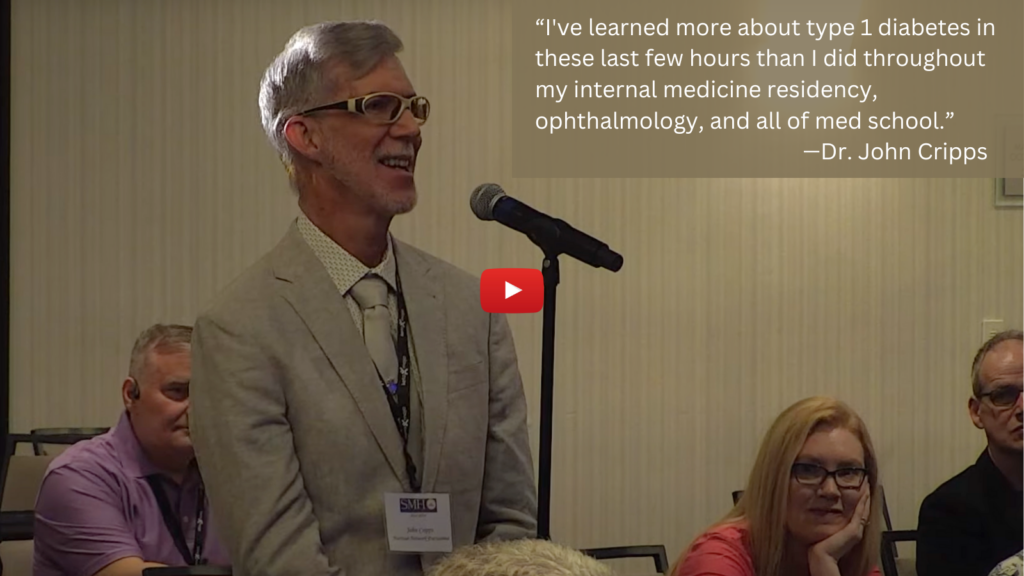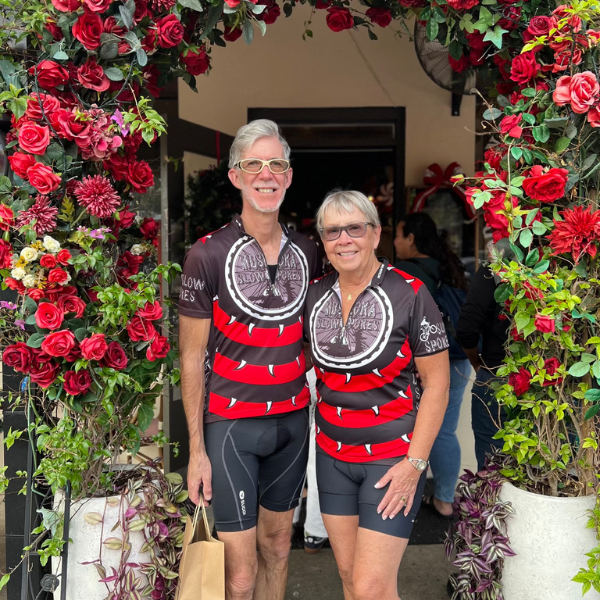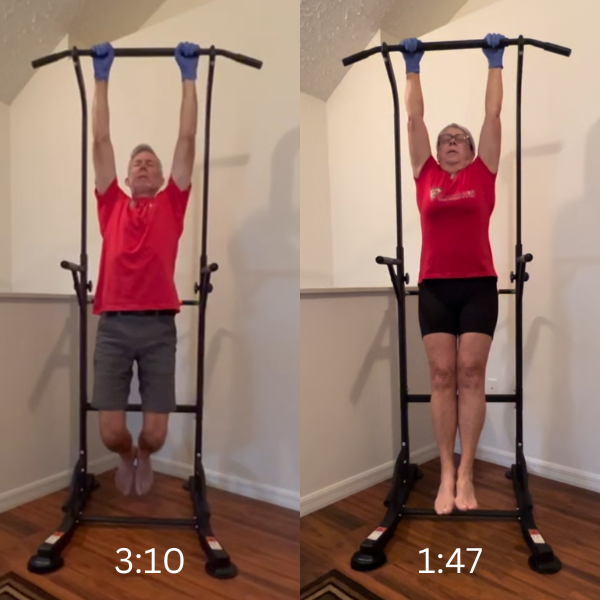Key Takeaways from Boca Symposium, Including a Paradigm Shift in Type 1 Diabetes Management

After experiencing more than five hours of insightful presentations on the management of type 1 diabetes, retired ophthalmologist Dr. John Cripps approached the microphone during a Q&A session at the Symposium for Metabolic Health in Boca Raton, FL.
“I’ve learned more about type 1 diabetes in these last few hours than I did throughout my internal medicine residency, ophthalmology, and all of med school,” he said. “So very impressive…”
This powerful statement, delivered at the tail end of a specialized day-long workshop, underscored the pivotal theme of this year’s Symposium: a comprehensive, two-day deep dive into the management of type 1 diabetes.
Presentations featured practitioners and researchers, as well as type 1 diabetes patients and parents of patients, sharing challenges and successes related to this disease, while shedding new light on strategies for managing type 1 diabetes to achieve more stable blood sugars and reduce risks of complications.
In a promising move towards wider education, these professionally recorded presentations are set to be released for complimentary viewing on the LowCarbUSA® YouTube Channel as a valuable resource for the type 1 diabetes community. Subscribe to the channel for notification of their release.

As the workshop concluded, John’s profound observation continued to linger in my thoughts. It turned out I wasn’t alone in this; LowCarbUSA Co-Founder Pam Devine echoed these sentiments during a conversation we had about the workshop. She encouraged me to engage further with John, to glean insights from his extensive experience in treating thousands of patients with retinopathy and other eye conditions, often a consequence of both type 1 and type 2 diabetes, as well as poor metabolic health.
Later that evening I introduced myself to John and his wife Arienne, and we talked extensively. The Symposium struck a chord with them and resonated with their own significant lifestyle changes over the past decade.
I learned about Arienne’s courageous battle with non-Hodgkin’s lymphoma and John reflected on his medical career which led him to the realization of the critical role of metabolic health on healthspan and lifespan.

They told me of their shift from a vegetarian to a ketogenic, predominantly carnivore diet and how it was not just a dietary change, but a journey towards wellness. This transition significantly enhanced their health and provided a profound understanding of how nutrition can be pivotal in managing diseases like cancer and diabetes.
The Turning Point
Arienne was diagnosed with non-Hodgkin’s lymphoma in 2012 at age 67 and had a recurrence in 2015. Her oldest son accidently stumbled upon low-carb videos on YouTube in 2018, and suggested she explore the works of Dr. Jason Fung – renowned for his books like “The Diabetes Code” and “The Cancer Code”. Reading those books marked a turning point in their lives.
“My oldest son mentioned that I should look at those books because I had cancer,” Arienne recalled. This suggestion sparked a significant change in their dietary approach, and led John to becoming heavily involved with the Nutrition Network and Professor Tim Noakes.
For years, the Cripps had adhered to a vegetarian diet, influenced by the prevailing medical opinions of the time. John explains, “There were articles in medical journals promoting vegetarianism and veganism as healthier options, which we had followed until around 2010.” However, their experience with cancer and subsequent dietary changes led them to question these beliefs.
Since fully embracing a ketogenic, carnivore diet, both John and Arienne have experienced remarkable health improvements. At 78, Arienne is running again after a decade, preparing for a 5k run, and has made significant progress in her fitness, recently setting a personal record of 1:47 on a dead hang. She attributes her physical gains to her dietary changes and a determined attitude toward staying fit. John recently did a dead hang for 3:10.

“Since going carnivore, I have ditched all oils, and now use tallow and butter. I believe that sugar makes me hungry, carbohydrates make me fat, and seed oils make me inflamed.”
Their journey underscores the potential benefits of therapeutic carbohydrate reduction and ketogenic diets, not just in weight management but also in improving overall health and vitality. As they continue to defy age with their fitness activities, including cycling on a custom tandem mountain bike, John and Arienne explained the importance of maintaining a great quality of life rather than simply trying to remain alive.
They explained to me how a shift to a low-carb lifestyle transcended beyond physical health, bringing profound mental and emotional benefits. Arienne vividly recalls the challenging times during the pandemic, “I was in trouble for a while because I couldn’t see my kids, I couldn’t see my grandkids…I’m pretty sure that I was depressed.”
It was during that time frame that they shifted even further to a ketogenic and heavily meat-based diet. The transition to a more carnivore diet marked a significant turnaround in her wellbeing. “I’ve been happier than I’ve been in the last four years…mentally, it’s been huge, absolutely huge,” Arienne shared, highlighting the diet’s impact on her mood and mental clarity.
John echoed this sentiment, noting the dramatic difference in Arienne’s mental health. “It’s just so empowering to me to see her get that lift ,” he said.
Reflecting on her cancer journey, discussed the potential role her diet may have played in both the development and recovery from cancer. She suspects pesticides and glyphosate on fruits and vegetables might have contributed to her health issues. “I believe that probably caused my cancer,” she says, pointing towards her heavy consumption of kale and other vegetables. Her recovery and remarkable resilience, she believes, are significantly influenced by her dietary changes. “I’ve never felt better in my life…I’m stronger now than I was when I was in my 30s,” Arienne says.
A Doctor’s Insight: Understanding Disease Through Nutrition
During his 30-year career as an ophthalmologist, John was particularly struck by the increasing number of patients with diabetes-induced eye issues. This alarming trend sparked his curiosity about the underlying causes of these diseases. His relentless schedule in the emergency department, coupled with the demands of ophthalmic surgery, initially left him with little time to explore these questions.
Arienne witnessed many of these same discouraging things as she expertly managed the ophthalmology practice for more than 30 years.
“I wish I’d figured out sooner how to use my interest in physiology and biochemistry to think more about why on earth these people are getting sick,” John lamented,
But despite the overwhelming workload, he did eventually begin to question why conditions like diabetes and macular degeneration were on the rise. His background in biochemistry and physiology fueled this inquiry, yet the demands of his clinical work often overshadowed these thoughts. It was a struggle for him to balance the immediate needs of his patients with his deeper interest in the root causes of their conditions.
John recalls numerous instances where he encountered patients whose vision problems could have been mitigated or prevented with better lifestyle choices. This realization was a turning point in his career. It led him to explore the field of nutritional science, hoping to understand and combat the root causes of these lifestyle-related diseases.
When asked about the root causes of the increasing prevalence of metabolic diseases, he pointed out the detrimental effects of modern dietary habits. “Overconsumption of carbohydrates and seed oils are strongly associated with insulin resistance,” he noted, highlighting the role of processed foods in exacerbating these health issues. He further explained that these foods are often engineered to be addictive, leading to overconsumption and metabolic disturbances.
Addressing the topic of standard care management versus metabolic therapies, John expressed concern about the current approach to treating insulin resistance. “Sadly current standard of care is the standard American diet, high carb, and high PUFA. This does not address the root cause of insulin resistance,” he said. He advocates for therapeutic carbohydrate reduction (TCR) as a more effective approach, capable of improving risk factors for chronic diseases.
John also shared insights on the potential of therapeutic carbohydrate reduction to impact retinopathy, especially in diabetes patients. While he acknowledged the lack of publications on reversing diabetic retinopathy with TCR, he is optimistic about its role in prevention and stabilization. “Because strong drugs cause regression of several grades of severity—often lasting 5 years, remission or reduction of retinopathy grades seem plausible with attainment of non-diabetic A1c levels,” he stated. “We need studies to show regression of pre-existing disease in patients reversing their type 2 diabetes or achieving A1c levels under 5.8% for type 1 diabetes patients.
When discussing the dramatically increased prevalence of macular degeneration, John referred to the work of Dr. Chris Knobbe, suggesting that seed oil consumption could be a major contributing factor. We interviewed Dr. Knobbe for an article last year before his compelling presentation on seed oils and carbohydrates at the San Diego Symposium in August.
John described seed oils as “nutrient deficient, pro-inflammatory, pro-oxidative toxins loaded with advanced lipoxidation end products. In short this leads to severe mitochondrial dysfunction with increased reactive oxygen species (ROS) and cell death.” This can lead to severe mitochondrial dysfunction, a key factor in age-related macular degeneration.
He emphasized the importance of real, whole foods, stating, “Eat real whole food, minimize carbohydrates, avoid seed oils, and consider the value of animal protein over plant protein.” He further noted the challenges faced by vegans in maintaining health without supplements and vitamins.
Expanding on the topic of fats, John highlighted the benefits of natural fats that are low in omega-6 fatty linoleic acid. “Beef tallow, lard, butter, and, if affordable, grass-fed options are key,” he advised. For vegetarians or vegans, he recommended alternatives like avocado, palm kernel, or coconut oil. He also cautioned against the widespread adulteration of oils and recommended obtaining fats from whole foods. “Best to get fat from whole foods like oily fish and ruminants,” he added, emphasizing the nutritional value of salmon, sardines, anchovies, mackerel, herring, beef, bison, deer, and moose.
John’s more recent work with Professor Tim Noakes and his involvement as an educator in the Nutrition Network marked a significant shift in his approach to medicine. This new path has allowed him to integrate his love for biochemistry and physiology with clinical practice, offering a more complete approach to patient care. By educating himself and others about the impact of nutrition and lifestyle on health, he is now working to prevent the very diseases he had spent years treating.
For those interested in pursuing accreditation as a Metabolic Health Practitioner (MHP) through the Society of Metabolic Health Practitioners (The SMHP™), one of the pathways to accreditation is the Nutrition Network pathway.
As our conversation continued, John told me people frequently ask him what are the important things to focus on when seeking to improve their metabolic health.
“My advice to people, when they are looking to improve their metabolic health is to focus on the 8 S’s”:
- Satiety (therapeutic carbohydrate reduction)
- Strength (weight training and aerobic exercise)
- Spirituality
- Sunshine
- Sleep
- Stress
- Socialization
- Sugar Addiction
Insights from Low-Carb Conferences and Beyond
John and Arienne explained how their journey into the world of low-carb living has been significantly enriched by their participation in LowCarbUSA® events, providing them with not only valuable information but also a sense of community and shared purpose.
“I really like the conferences, because the information is so pertinent to what is really happening in the world.” She stresses the importance of maintaining control over one’s health decisions, a theme resonant among many conference attendees.”I don’t want to be a slave to Pharma,” she said, underscoring a desire for independence from pharmaceutical solutions.
Arienne’s commitment to health goes beyond mere appearance or weight. “The biggest thing for me is muscle mass and strength. I just really want to be strong,” she asserts, emphasizing her goal of active and healthy aging.
John’s perspective, shaped by his medical background, brings a deeper understanding of the link between diet and disease. Discussing the epidemic of metabolic diseases, he notes, “It’s more than just the sugar…it’s the seed oil, sugar, it creates this influx of over-nutrition to your mitochondria.” This insight highlights the complex interplay between various dietary components and health, particularly in the context of eye diseases.
Arienne’s observations about the food industry’s role in health are equally poignant. “The food industry has become so crafty at knowing exactly what becomes addictive,” she notes, pointing out the challenges posed by the prevalence of processed foods, sugar, and seed oils in modern diets.
A Passion for Tandem Bicycling and Optimizing Health
John and Arienne Cripps are not only advocates for a low-carb lifestyle but also passionate about staying active together, especially through tandem bicycling. Their love for this activity is more than just a hobby; it’s a symbol of their journey together and their commitment to health and fitness. “We’ve done as much as 75 miles per hour downhill in Kauai,” Arienne recalls, highlighting their adventurous spirit and physical prowess.
Their tandem cycling adventures have included remarkable feats, such as a 600-mile journey around the Gaspe Peninsula, which Arienne embarked on shortly after her chemotherapy. This journey was not just a physical challenge but also a fundraiser for cancer research, showing their dedication to giving back to the community. “I donated $10,000 to the cancer center,” she says, reflecting on her commitment to contributing to the cause.
Tandem bicycling for the Cripps is more than just exercise; it’s a shared experience that brings them closer, physically and emotionally. “It’s kind of like ballroom dancing. You either can do it together, or you just can’t,” Arienne explains, drawing a parallel between their biking and their harmonious relationship.
Arienne emphasizes the importance of friendship and mutual respect in relationships. “We became very good friends with absolutely no intention of ever having a relationship beyond that.” This foundation of friendship, she believes, was crucial in building their strong, lasting bond.
John spoke about the importance of goal-setting and personal enjoyment, “I would ask people starting out…What would bring you enjoyment in your life?” He encourages people to start with exercises they enjoy and are willing to do, stressing the importance of happiness in one’s chosen activities.
Their advice extends to resilience and strength, especially in older age. Arienne’s strength and fitness, even surpassing her younger self, stand as a testament to their lifestyle choices. “I’m stronger now than I was when I was in my 30s,” she says, highlighting the benefits of their carnivore diet and regular exercise.
“I don’t tell other people what to do. I just tell them what I’m doing and how it’s working for me,” Arienne explains, showcasing their approach to influencing others.
Their commitment to health extends beyond themselves, as they actively engage with others in their community, offering support and sharing experiences. This includes helping a neighbor diagnosed with Parkinson’s and another with stage four bowel cancer. Their actions reflect their belief in the power of community and support in the journey towards better health.
Register Today for the 2024 San Diego Symposium
Everyone who attends a LowCarbUSA® Symposium for Metabolic Health has a story. We’ll continue to feature articles like this one. Let us know if you have a story you’d like to share.
The 2024 9th Annual San Diego Symposium for Metabolic Health will be held August 15-18, 2024. We will dedicate a special session to exploring the connection between mental health and metabolic disease at this conference. Learn more and register here.


